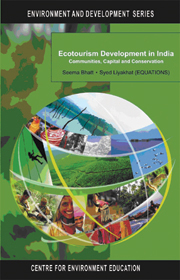Book contents
- Frontmatter
- Contents
- About the Authors
- Preface
- 1 Tourism and Ecotourism – General Introduction
- 2 International Legal and Policy Frameworks
- 3 National Legal and Policy Frameworks
- 4 Ecotourism: Voices of Dissent
- 5 Ecotourism: Some Successful Initiatives
- 6 Analysis and Discussion
- 7 Towards Sustainable Ecotourism
- 8 Ecotourism: Grounds for Protest
- 9 Ecotourism: Glimpses of Successful Initiatives
- Bibliography
2 - International Legal and Policy Frameworks
Published online by Cambridge University Press: 05 November 2011
- Frontmatter
- Contents
- About the Authors
- Preface
- 1 Tourism and Ecotourism – General Introduction
- 2 International Legal and Policy Frameworks
- 3 National Legal and Policy Frameworks
- 4 Ecotourism: Voices of Dissent
- 5 Ecotourism: Some Successful Initiatives
- 6 Analysis and Discussion
- 7 Towards Sustainable Ecotourism
- 8 Ecotourism: Grounds for Protest
- 9 Ecotourism: Glimpses of Successful Initiatives
- Bibliography
Summary
Introduction
For ecotourism development to be sustainable, it is important that it follows the directives provided in various international covenants and national policies and laws. This chapter, introduces a few crucial legal and policy frameworks at the international level, which have a bearing on the manner in which ecotourism is developed in India. There are numerous codes, guidelines, protocols and charters on ecotourism and sustainable tourism that have been formulated by different stakeholders especially governments, tourism industry and inter-governmental and non-governmental organisations. It would be beyond the scope of this book to enumerate and analyse all these covenants. Some important covenants have been analysed and presented. These are Agenda 21, 1992; Commission on Sustainable Development; Convention on Biological Diversity; International Year of Ecotourism, 2002; General Agreement on Trade in Service; the UN's Declaration on Rights of Indigenous Peoples and the UNWTO Global Code of Ethics for Tourism, 2000.
Agenda 21, 1992
Agenda 21 is an outcome of the Earth Summit at the Rio de Janeiro United Nations Conference on Environment and Development (UNCED) in 1992. It is a well-defined programme of action for global sustainable development. It addresses the global environment and development problems and suggests strategies, plans, policies and processes to achieve a balance between environment and development. It addresses social and economic dimensions, conservation and management of resources for development, strengthening the role of major groups and means of implementation.
- Type
- Chapter
- Information
- Ecotourism Development in IndiaCommunities, Capital and Conservation, pp. 13 - 37Publisher: Foundation BooksPrint publication year: 2008

